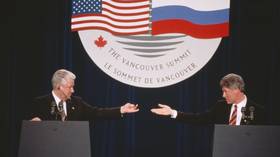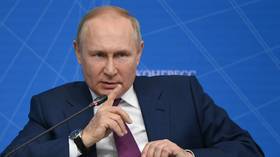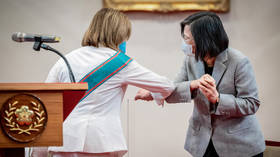Cooperation with the West is over – Russia

Russia's decades long attempt to integrate with the west is not only over, but even cooperation is now off the cards, a senior strategist in Moscow has warned. Aleksey Drobinin, head of the Russian Foreign Ministry’s Foreign Policy Planning Department, believes that future dealings can only take place on a "transactional" basis.
Drobinin, head of the Russian Foreign Ministry’s Foreign Policy Planning Department, was writing in a keynote article published on Wednesday. He explained that the West is trying to protect its power from an emerging multipolar world, which means countries like Russia which reject Washington’s so-called “rules-based order” must resist.
Thus, after the present crisis in Ukraine, there can be no return to attempts at a rapprochement with the US and its allies, he argues.
Russia’s attack against Ukraine became “a milestone on the path towards a new world order,” Drobinin added. He heads a department responsible for academic research and strategic planning on behalf of the ministry.
“Regardless of the duration and outcome of the special military operation, even now we can acknowledge that a three-decade-long period of mostly constructive, if problematic cooperation with the West is gone for good,” he said.
The breakup dispels “the last illusions” that Russians may have about the merits of a “friendly takeover” of their country by the US and its allies after the collapse of the Soviet Union, the analyst added.
He assessed that amid the current confrontation, the “irrational equation of Western with ‘progressive,’ Western with ‘attractive’” by some people in Russia was no longer “up to date.” Such moods, he said, persisted in various forms since the time of Peter the Great, who ruled the country in the late 17th and early 18th century.
The 3,500-word article gives a preview of the upcoming update of Russia’s foreign-policy concept, a document that guides the work of the foreign ministry and other parts of the government. Moscow perceives as inevitable the arrival of a multipolar world order, which would replace a brief moment of US-led unipolarity that emerged in the 1990s.
Several “civilizational” blocs, each led by a powerful nation like the US, China or Russia, will be the stakeholders in the future, but the exact configuration is yet to be determined, Drobinin predicted.
The diplomat accused the US of actively undermining international institutions and of otherwise destabilizing the world in a fruitless attempt to delay the reduction of its power. Russia is at the forefront of opposing Washington, he said.
“We have to realize that the Russophobic-minded collective West is a dangerous and motivated … opponent that remains strong, has a leading military-technological potential and controls a large portion of the global markets, financial resources, logistical chains and flows of information,” he warned.
Russia will pursue closer ties with non-Western players, foster regional integration, help create new international financial and management mechanisms that would be free from Western control and otherwise ensure that it would have a say in how the future multipolar world would work, Drobinin said.
“For many [nations] the acute problems are access to cheap energy (not a switch to ‘green’ technology), socio-economic development (not the ultraliberal version of human rights), security and sovereign equality (not the imposed Western-style electoral democracy),” he argued.
As for dealing with nations that Russia deems “unfriendly,” it is currently “only possible on a one-shot transactional basis … in cases where Russia would benefit and where there is no suitable alternative,” the diplomat said.
According to Drobinin, Moscow hopes that Europe would distance itself from Washington and become a force of its own, as political forces pursuing sovereignty and national interests gain power.
Russia could “offer to Europe a scheme of future cooperation that would on the one hand support autonomist desires of the Europeans and on the other hand would ensure that our nation would not face any kinds of threats from the European direction,” he wrote. Pursuing that goal would be a challenge, he acknowledged.















